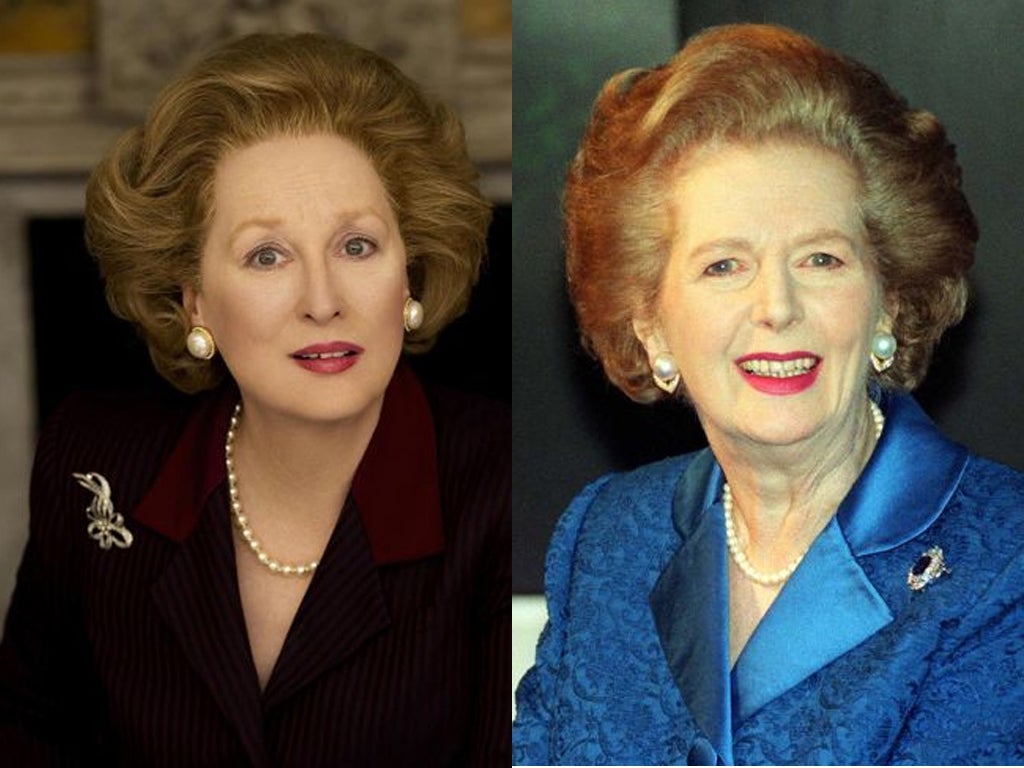Portrait too blue to be true

There is one very good reason to see The Iron Lady, perhaps good enough to neutralise the reasons to feel annoyed by it. Meryl Streep as Margaret Thatcher gives a performance of uncanny exactitude and command that overleaps the bounds of mimicry: despite a face encrusted with prosthetics and make-up, Streep somehow conveys through outward presentation (clothes, hair, voice) the inward drive of her personality. Strictly as an impersonation it will be seen as definitive for years to come.
So, as a portrait of Thatcher, we are in good hands. As a portrait of Thatcherism, however – of the era and its discontents – it feels about as reliable as an MP's expenses claim. The director, Phyllida Lloyd, and writer, Abi Morgan, may not be card-carrying Tories but they present the tumultuous years of Thatcher's premiership (1979-1990) in a manner that could only soothe the party faithful. No peep of guilt, no shadow of regret, is allowed to spoil the procession. It's not that Lloyd and Morgan approve of what Thatcher did; it's that they offer no trace of opposition, no countervoice of doubt to the steamroller chug of The Lady's unarguable will. This is the way it was, the film says, and this (by implication) is the way it had to be.
The structure of the film shores up this fatalistic approach by emphasising personality over politics. It begins near the end, with the Iron Lady in her dotage and rusting badly. Dementia has her in its grip; she hallucinates and talks to her beloved Denis (Jim Broadbent, a little hazy himself), who's been dead for some years. Pottering about her house she looks lost and distracted, her mind wrestling with fuddled flashbacks to the dim and distant.
It is natural that Lloyd and Morgan are at their most sympathetic to Thatcher as a fledgling politician, facing down a guard of Tory old boys who plainly can't get over the idea of a woman – still less a grocer's daughter – ascending through the party ranks. These film-makers would surely find a resonance in Thatcher's pioneering spirit, their profession not being noted for the number of high-up jobs it hands out to women.
It is when the film enters the battleground of the 1970s and 1980s that its starry-eyed view of Thatcher becomes problematic, for it is no longer just the story of "one woman's ambition" – it is of a nation plunged into violent strife and lasting antagonism. Her pious quoting of St Francis of Assisi ("where there is despair, let there be hope") on her accession to No 10 has always carried a ghastly irony, but the film persists in keeping the woman separate from her works.
As the clamour of discontent rises in the background, the lady remains steadfast, unbudgeable: "The medicine is harsh, but the patient requires it in order to live." With her mongoose stare, Streep chillingly recalls the PM's warrior persona, chainmail almost visible beneath the matronly blue as she smites the unions, the miners, the IRA, even the Argentine junta.
The uncritical nature of the film, its acceptance of Thatcher as a self-made legend, will infuriate those who remember the 1980s as a bitterly divisive era. But I don't think anyone will be unmoved by Streep's performance. Less stooped than Thatcher, she hasn't quite managed to walk the walk – what Alan Hollinghurst described in The Line of Beauty as Mrs T's "gracious scuttle" – but boy, does she ever talk the talk. Streep has got the voice, that maddening stately drone, so spot-on it's eerie. All her other tics seem to follow from it. It's an astonishing feat, far bolder and wittier than the film that surrounds it.
Join our commenting forum
Join thought-provoking conversations, follow other Independent readers and see their replies
Comments
Bookmark popover
Removed from bookmarks